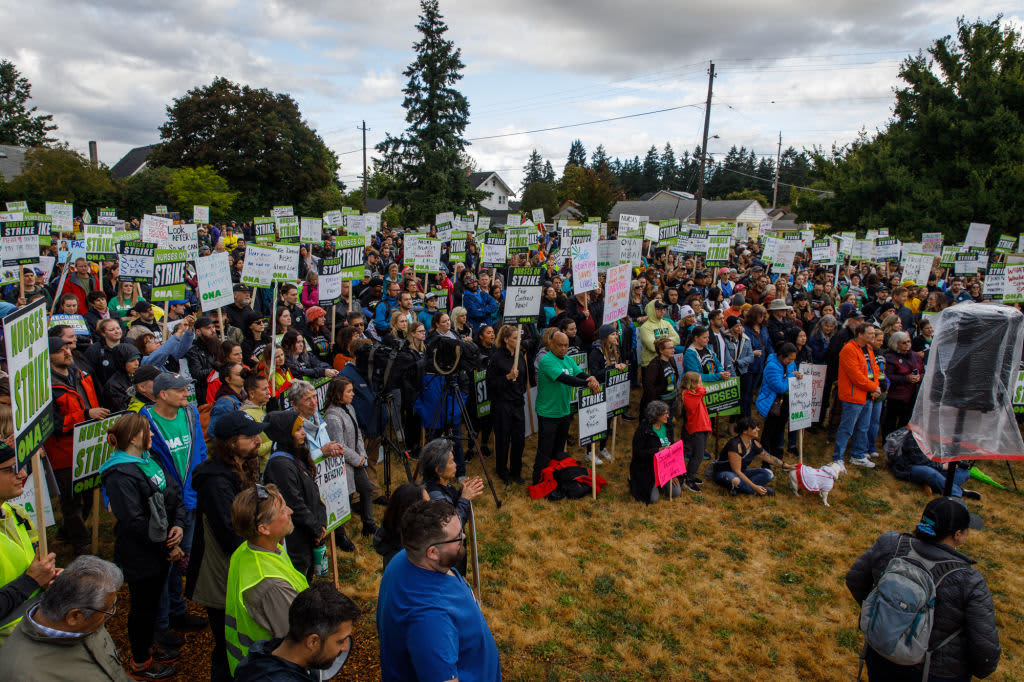- Nurse strikes are underway around the country; Others have achieved results at the bargaining table.
- Providence Portland nurse strike ends with substantial increases in nurse pay and paid leave.
- Strike hits the one-month mark in New Jersey.
As nurse strikes continue nationwide, other nurse strike participants are reaping the benefits of their work stoppages.
Strikes have swept industries around the country, from hospitality to healthcare. The nursing profession is not immune, with long-simmering tensions over burnout and working conditions only exacerbated by the COVID-19 pandemic.
Here’s a roundup of major nurse strikes around the country, including those still ongoing and those that recently made an impact at the bargaining table.
The Providence Portland Nurses Strike
Nurses are declaring victory in Oregon.
From June 19-23, more than 1,800 union nurses in three facilities, collectively encompassing about 500 patient beds, participated in a strike against Providence Health, the state’s largest healthcare system. The Providence Portland nurse strike alone included roughly 1,400 nurses, with an estimated 100 nurses at Providence Seaside and 400 nurses and clinicians at Providence Home Health and Hospice also participating.
Two months later, the Oregon Nurses Association (ONA), which represented the groups, is touting a breakthrough at the negotiating table. The news came on August 11 that Providence and ONA had reached tentative contract agreements for nurses and clinicians at Providence Portland and Providence Seaside. Although a formal ratification has not been publicly announced, the agreements would purportedly provide pay increases between 17-27% and an additional 40 hours of paid time off.
Nurse Strike Stretches on in New Jersey
A nurse strike at Robert Wood Johnson University Hospital in New Brunswick, New Jersey has now been underway for more than a month.
On August 4, approximately 1,700 nurses walked off the job to protest low pay and staffing levels.
“The pandemic pushed us to a breaking point where we were forced to take care of more patients than we should have been,” striking nurse Jennifer Kwock, RN, told NJ Spotlight News. “And since then, they never backed off on our responsibilities and we’re not machines. So the problem is we’re doing the jobs of more than one person. It’s not fair to the patients to not get the time and the care that they deserve because we’re spread across too many patients.”
While there are currently no public signs of progress between the two sides, and with pessimism setting in, the nurses’ side recently received a shot in the arm from former presidential candidate and U.S. Senator Bernie Sanders.
A Lockout in Illinois
In late August an estimated 530 nurses were locked out of their workplace in Joliet, Illinois, about an hour outside Chicago. Nurses at Ascension St. Joseph-Joliet claimed low pay and poor safety conditions forced them to take action, while hospital leaders filled the staffing vacuum with contract nurses.
“We are underpaid [compared with] every other hospital in the area,” said striking nurse Sue Pellegrini, according to a local media account. “And, besides that, their goal is to bring in new nurses, try to split us up, the old nurses versus the new nurses, pay them more but not giving 21 years or over any raises whatsoever, not even cost-of-living raise.”
On August 23, Ascension St. Joseph-Joliet officials announced they were implementing a “strike contingency plan,” which would involve locking out striking nurses without interrupting patient care.
“Notwithstanding this disheartening strike, we will continue to negotiate in good faith to come to a mutually beneficial agreement on an initial contract that respects the human dignity and rights of all,” said hospital officials in a statement regarding the lockout. “We look forward to returning the focus to resolving issues at the bargaining table and reaching agreement on a fair and reasonable collective bargaining agreement for our registered nurses.”
Shortly after the lockout, nurses returned to work. The two sides, however, remain far apart on contract talks, which are set to resume in September.
Mount Sinai Hospital Nurses Strike: Breaking New Ground
Earlier this year in New York City, nurses at Mount Sinai Hospital’s neonatal unit, which is known for treating very sick infants, conducted a strike for three days to protest what they claimed were unsafe nurse-to-patient ratios.
As a result of that effort, the New York State Nurses Association union earned an unprecedented contract that held the hospital financially liable for not meeting new staffing ratios. Because of that provision, in May, an arbitrator ordered the hospital to pay nurses $127,000 in penalties for a “persistent pattern” of dangerously understaffing the unit between January and April, according to a ruling originally reported by Politico.
“This is about life and death for some of our patients,” Meghan Hurlbut, a nurse who works in the unit, told Politico.







